The COVID-19 epidemic began more than a month ago and food has become a matter of fundamental importance. The growers who produce fruit and vegetables have started to play a vital role in protecting people’s lives since the outbreak of the coronavirus.
Online opinions vary when it comes to such issues as the position of growers and others in the fresh produce industry, the prices of fresh products, and the changes in supply and demand. We therefore invited Dutch Sino Business Promotions (DSBP) to contact several producers and traders who represent the agricultural industry. We asked them about the general conditions in the Chinese agricultural industry since the outbreak of the coronavirus, as well as specific conditions in the greenhouse industry.
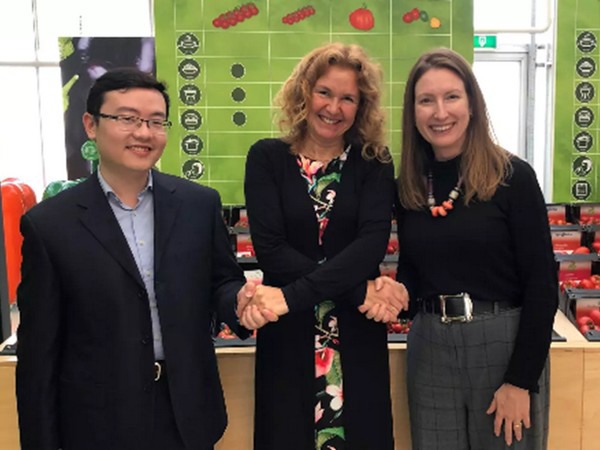
Dutch Sino Business Promotions joins Tomato World
Have the supply and the price of fruit and vegetables been stable since the COVID-19 epidemic began?
Companies in domestic production areas were heavily influenced by the outbreak of the coronavirus during the early days of the epidemic. On the one hand, some companies were ‘unable to deliver products, and unable to receive raw materials’. Furthermore, in some areas the vegetables piled up and became unmarketable. On the other hand, a seasonal supply shortage combined with the added costs of harvesting, transport, and wholesale trade, which all increased because of the epidemic, pushed the prices of some fruits and vegetables to their highest point this year.
A number of agricultural companies publicly supported government policies and in their wake the conditions among fresh fruit and vegetable producers began to change. This development gained particular momentum when influential medium- and large-scale companies such as Lankuaikei Agriculture Development (Shanghai) Co., Ltd and Cau Futong (Hebei) Co., Ltd. offered their support for government policy. They were able to show that production and prevention were ‘not mutually exclusive’.
These agricultural companies helped to organize market operations, they guaranteed fruit and vegetable supply, and the market began to recover. For example, recently the market price of peppers was around 8 yuan [1.15 USD] per 0.5 kg. The market price of tomatoes was around 5 yuan [0.72 USD] per 0.5 kg. And the market price of snack cucumbers was around 5 yuan [0.72 USD] per 0.5 kg. These prices are all on the same level as around this time last year.
Many wholesale agricultural markets have resumed operations and the number of active traders is growing, although the obvious exceptions to this development are wholesale markets in the most affected areas in Hubei as well as returning traders who are still in quarantine. More than 95% of the managers in the most important fruit, vegetable, and processing companies have resumed operations. Each segment in the supply chain is gradually recovering and the distribution of vegetables has already reached the same level as before Chinese Spring Festival (25 January 2020).
How are the circumstances in greenhouses and on vertical farms?
After authorities gained a measure of control over the outbreak of the coronavirus, many horticultural companies in China resumed operations. Companies implemented special rules in the workplace to limit the risk of infection for their employees. Office workers mostly work from home to limit exposure, but this is not an option for employees in production areas. They follow strict guidelines to ensure regular production levels. As for distribution, apart from Wuhan at the heart of the epidemic in central China, most areas in China have their distribution networks up and running again. Vegetables from large production areas all reach their destination on time.
Chinese farmers have valued spring plowing and spring sowing since ancient times. The need to transport farming resources gradually grows as the spring plowing season moves from south China to north China. Different levels of the Chinese government implemented policies to ensure that the delivery of farming resources reached their destinations in time. Companies also worked hard to adjust the timing and the method of plantation and production to respond to the uncertainty the COVID-19 epidemic has brought along. For example, Cau Futong Nanhe Greenhouse Agriculture Group adjusted the supply of lights, carbon dioxide, and fertilizers mixed with water to extend the production season of vegetables until June, which will improve the production volume later in the season.
Another good example is Fujian Sanan-Sino Science Photobiotech Co., Ltd (SANANBIO), which is a leading power in indoor farming that boasts of a 10,000-sqm plant factory inside a single building. To meet the increasing demand for fresh greens, SANANBIO adjusted such factors as plantation density, lighting and nutrient solution supply and successfully delivered extra yields in lettuce (+43%) and bok choy (+35%). More Jewel Orchids, or Anoextochilus roxburghii, have also been planted as this cultivar of medical herb is listed by medical professionals as one of the Traditional Chinese Medicines to safeguard human beings against the COVID-19. Combinations of the above produces have been provided to the customers so as to meet their daily nutrition intake whilst with a discounted price.
A sense of responsibility among horticultural companies
Cau Futong, with its headquarters in Bejing, is an agricultural company that provides high-tech supply services. Its subsidiary company, the Xingtai Nanhe Production Group, continued to supply vegetables to important markets in Beijing, Tianjin, and Hebei at 20% below the market price. The company supplied more than 3 tons of vegetables per day. At the same time, the company also provided special deliveries to hospitals in Xingtai city.The company supplied hospitals with fresh vegetables at cost price to make sure that doctors on the frontline of the COVID-19 epidemic were able to meet their need for fresh vegetables.
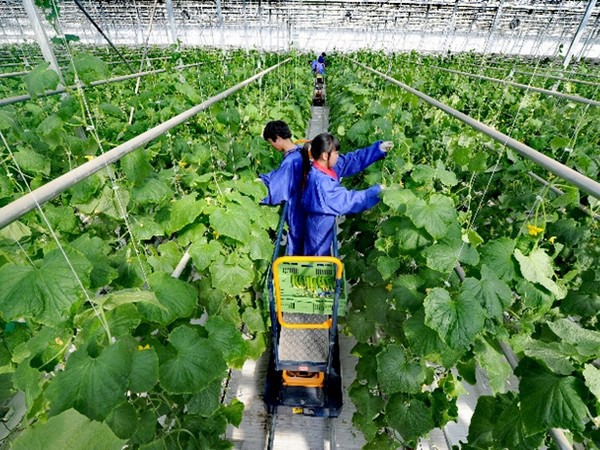
Cau Futong production area
SANANBIO’s plant factory is located in Fujan and is capable of producing 1.8 tons of top-quality vegetables every day in its 10,000-sqm plant factory inside a single building. Its leafy greens are available in more than 300 sales points throughout the province. During the outbreak of the novel COVID-19, customers needed only several clicks on their cellphones before bags of fresh produces arrived at their homes so as to save them the risk of unwanted physical contacts in crowded malls when bulk buying. For plant factory’s produces, the entire cultivation process and packaging take place in clean rooms, where disinfection is required of each and every person upon entering in order to cut out any chances of contamination from the source before bagged greens are delivered to customers’ homes via cold chain. In addition, SANAN GROUP, the parent company of Sananbio, donated 10 million yuan (USD1.44 million) to Jingzhou, a city under severe attack by the virus, to fight against the epidemic.
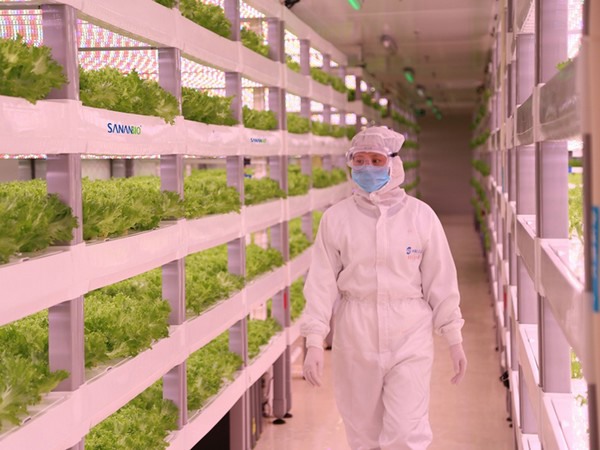
SANANBIO breeding facilities
The Lanzhou New Area Modern Agricultural Investment Group is one of the leading fruit and vegetable producers in west China. From the time of the outbreak, the company has produced fruit and vegetables around the clock to effectively prevent food supply shortages in Lanzhou city. Furthermore, the company set up an online platform to deliver fruit and vegetables at bargain prices to the rest of Gansu and nearby provinces. In the end, their efforts helped to guarantee sufficient market supply of fresh fruit and vegetables.
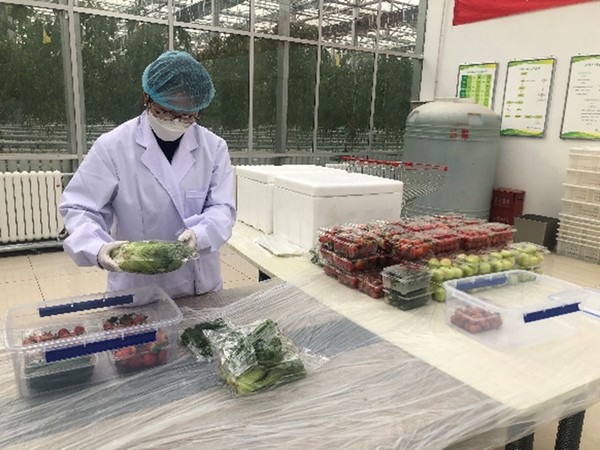
Staff at Lanzhou New Area Modern Agricultural Investment Group is packing vegetables
The main markets of the digitized plantation company Lankuaikei are in Shanghai and nearby areas. At the time of the outbreak, the company immediately resumed production to help relieve Shanghai’s significant market demand for fresh fruit and vegetables. At the same time, the company also donated bunches of Dutch cocktail tomatoes, produced in their own plantation, to medical personnel on the frontline of the fight against the coronavirus.
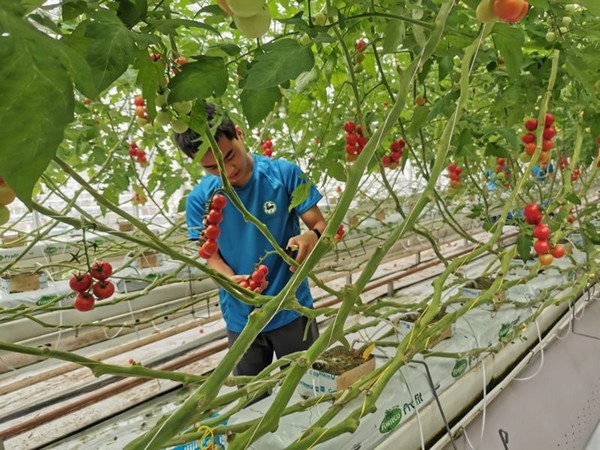
Lankuaikei
Dutch Sino Business Promotions B.V. (DSBP) is a leading consultancy company with headquarters in Rotterdam since 2006 and daughter company in Shanghai (China) since 2017. DSBP focuses on horticultural industry offering consultancy, market research, business support and matchmaking services to Dutch organizations doing business in China and vice versa. In recent years, DSBP has established an extensive professional network between the Netherlands and China. DSBP was appointed as China Liaison for PIB horticulture consortium which was supported by Dutch government to facilitate the horticulture business between both regions.
DSBP has served several leading Chinese horticultural companies including Cau Futong, SANANBIO, Lankuaikei. To be able to provide in-depth better service to horticultural enterprises, last year DSBP was invited to join Tomato World.
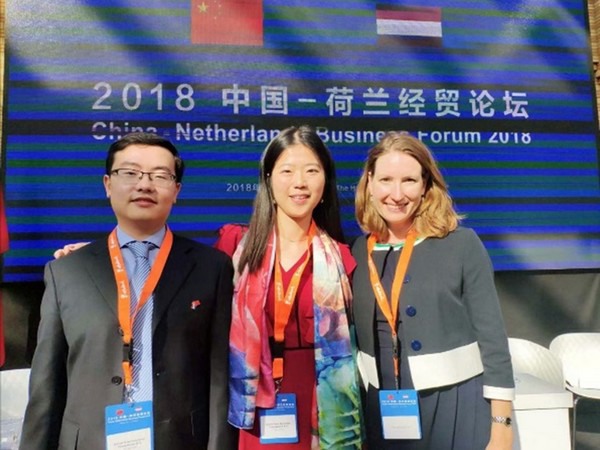
DSBP participating China-Netherlands Business Forum 2018
For more information:
Dutch Sino Business Promotions//荷中商务促进有限公司
Floriske Deutman
T: +31 (0)10 310 0829
dsbp@dutchsino.com
Hofplein 20
3032AC Rotterdam
The Netherlands
dutchsino.com
